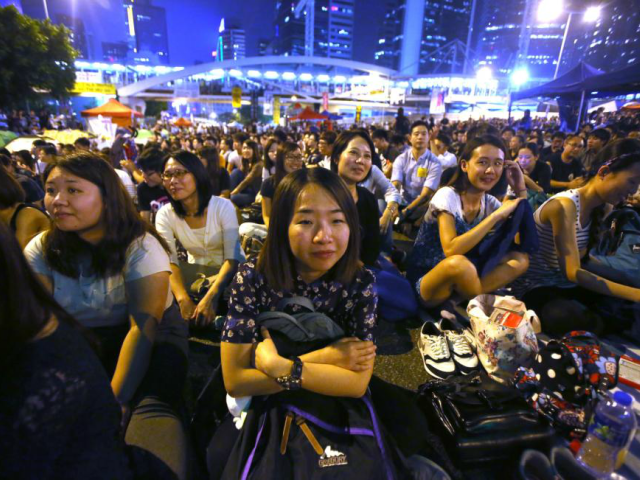China formally outlawed the Hong Kong National Party (HKNP) on Monday, marking the first ban on a political organization since Britain returned Hong Kong to Chinese control in 1997. The British Foreign Ministry pronounced itself “concerned by the decision,” while stressing the U.K. does not support the Hong Kong independence movement.
The ban is such serious business the South China Morning Post wondered if merely mentioning the HKNP on social media would be enough to trigger police action, saying:
Under the ban, anyone who associates with the party by serving the group, participating in gatherings or providing financial assistance could be liable on conviction to a fine and jail sentence of two to three years.
It was not immediately clear if Hongkongers who expressed their views on the party on social media or journalists who interviewed party members and reported their remarks would be flouting the ban. Asked if it would delete the HKNP’s Facebook page, which has close to 30,000 followers, the social media giant declined to comment.
According to Secretary for Security John Lee Ka-chiu, the Hong Kong Independence Party went beyond “political rhetoric” to “cause violence and public disorder” by calling for “armed revolution.”
He accused the party and its leader Andy Chan of building an international conspiracy with independence activists in Tibet, Taiwan, and China’s heavily Muslim province of Xinjiang, as well as urging the United States to “weaken China so that Hong Kong would stand a better chance of becoming independent.”
“I hope the government’s decision sends a strict and clear signal to society that any independence advocacy is not allowed in Hong Kong,” pro-China lawmaker Starry Lee Wai-king declared in a statement supporting the ban.
Beijing naturally supported the decision, applauding Hong Kong authorities for “maintaining the rule of law” and “performing the constitutional duty to safeguard the national sovereignty, security, and development interests” of the island.
Conversely, pro-democracy activists decried the ban on HKNP as a violation of basic political freedom and the first step toward crushing all dissent.
“The definition of national security is so broad that any calls for democracy could be blamed as posing threats to national security,” warned Joshua Wong Chi-fung, co-founder of the Demosisto party.
The process of banning the Hong Kong Independence Party has been underway for some time. The party was given three extensions to file its objections with regulators; when it missed the latest deadline, it claimed it was having trouble obtaining documents from the bureaucracy that were integral to its case.
The party’s legal team argued a ban would violate Hong Kong’s “Basic Law,” which is essentially the island’s constitution. The Basic Law is supposed to guarantee more freedom of assembly and expression for residents of Hong Kong than mainland Chinese citizens possess.
“I understand residents are concerned about freedom of assembly. I want to stress that Hong Kong residents have freedom of assembly, but this freedom is not without limits,” security chief John Lee responded.
Some observers believe the ban on the HKNP is a prelude to pro-China politicians in Hong Kong pushing through an amendment to the Basic Law that would give the island’s government broad new powers to suppress political activity seen as subversive by the mainland government. The last attempt to pass such an amendment in 2003 was withdrawn after massive street protests.
Chan has 30 days to file an appeal against the ruling. He indicated a willingness to fight on Monday without providing details of his next steps.
“We were once colonized by the Brits, and now we are colonized by the Chinese, where is our right to determine our own future?” said Chan, adding that it hardly seemed necessary for the regional government to pass the controversial Article 23 security amendment because it is “already in effect right now.”
“They can ban any political party due to threats to national security, they can disqualify legislators. In the past 20 years, Hong Kong has only progressed in one direction: backward,” he said.
Human rights groups, the British government, and (somewhat more obliquely) the U.S. government criticized the ban.
“We are concerned by the decision. The UK does not support Hong Kong independence, but Hong Kong’s high degree of autonomy and its rights and freedoms are central to its way of life, and it is important they are fully respected,” said the British Foreign Ministry in a statement.

COMMENTS
Please let us know if you're having issues with commenting.